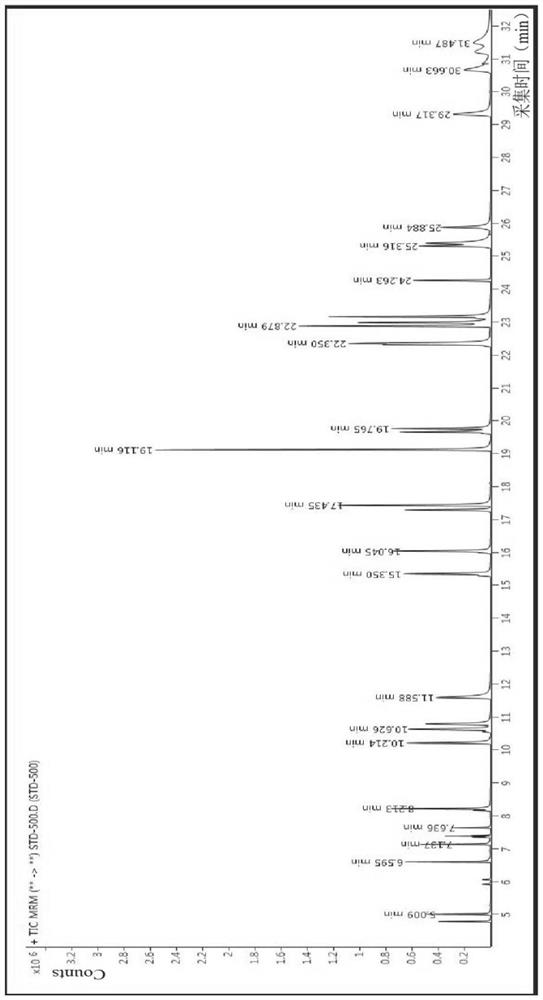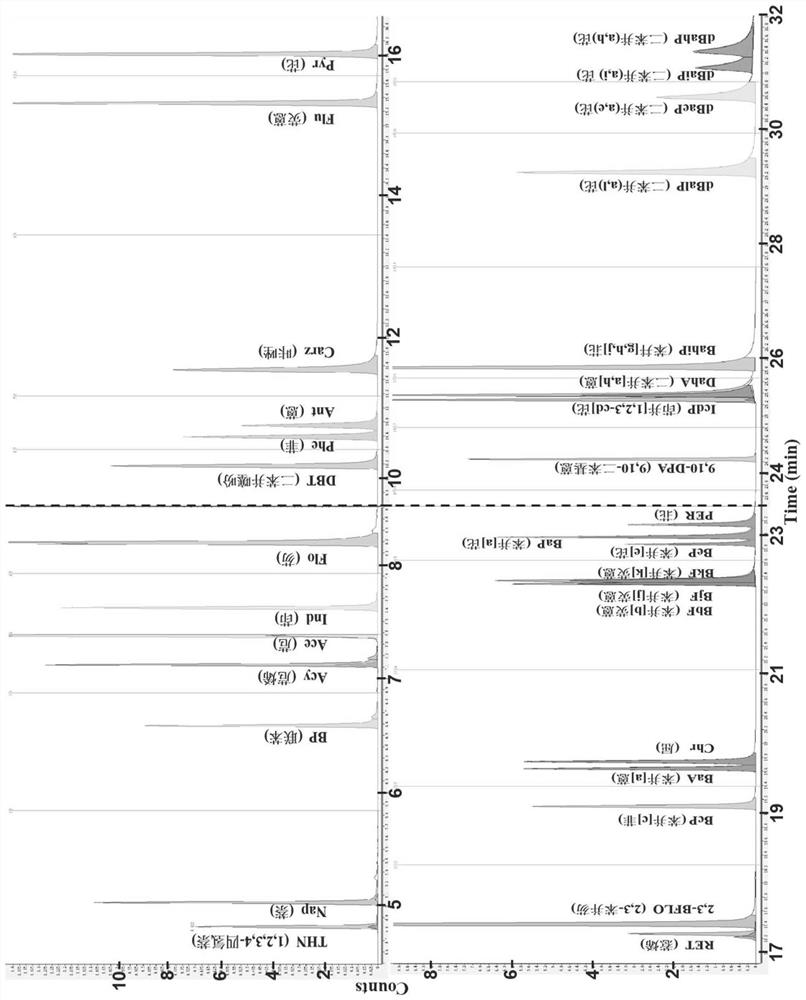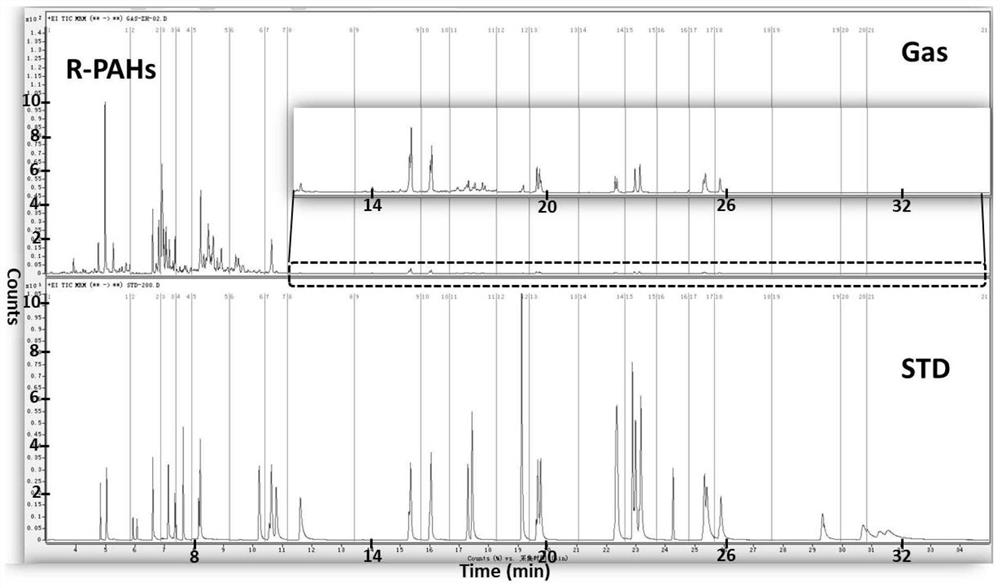A method for the detection of 123 polycyclic aromatic hydrocarbons in environmental media by gas chromatography-tandem triple quadrupole mass spectrometry
A triple quadrupole and mass spectrometry detection technology, which is applied to the field of detection of 123 kinds of polycyclic aromatic hydrocarbons in environmental media, can solve the problems of long detection and analysis time, few types of detection, and detection result errors.
- Summary
- Abstract
- Description
- Claims
- Application Information
AI Technical Summary
Problems solved by technology
Method used
Image
Examples
specific Embodiment approach 1
[0043] Specific embodiment 1: A method for detecting 123 kinds of polycyclic aromatic hydrocarbons in an environmental medium by gas chromatography in series triple quadrupole mass spectrometry in this embodiment is carried out according to the following steps:
[0044] 1. Classification: According to the group and control requirements of PAHs, 123 kinds of PAHs are divided into 3 categories, the first category is 32 kinds of conventional (including 16 kinds of optimal control) polycyclic aromatic hydrocarbons (R-PAHs), the second category is 50 kinds Methyl polycyclic aromatic hydrocarbons (Me-PAHs), the third category is 30 kinds of nitro polycyclic aromatic hydrocarbons (N-PAHs) and 11 kinds of hydroxy polycyclic aromatic hydrocarbons (OH-PAHs), classified for follow-up detection;
[0045] 2. Optimize mass spectrometry parameters by single-standard injection: ①According to the classification in step 1, take 32 kinds of R-PAHs standard products (10ppm), use full-scan (SCAN) m...
specific Embodiment approach 2
[0066] Specific embodiment two: the difference between this embodiment and specific embodiment one is that step two, step three and step four are different from specific embodiment one, specifically as follows: two, single-standard sampling optimization mass spectrometry parameters: 1. according to step one Classify, take 50 kinds of Me-PAHs standard substance (10ppm), adopt full scanning (SCAN) mode single-standard injection, through gas chromatography series triple quadrupole mass spectrometry (Agilent7890A-7000B type GC-EI-MS / MS) 50 kinds of Me-PAHs (10ppm) were detected with a single standard, and the mass-to-charge ratio scanning range was 50 to 400. The retention time and characteristic precursor ions of each standard were initially determined, and the three most abundant ions were selected from the characteristic precursor ions. Fragments, use the product ion scanning mode to crush the fragments, determine the characteristic product ions, and obtain the retention time, c...
specific Embodiment approach 3
[0086] Specific embodiment three: the difference between this embodiment and specific embodiment one is: step 2, step 3, step 4 and step 6 are different from specific embodiment 1, specifically as follows: 2. Single-standard sample injection optimization mass spectrometry parameters: ① press For the classification of step 1, 30 kinds of NPAHs and 11 kinds of OH-PAHs standard substances (10ppm) were taken, single-standard sample injection in full scan (SCAN) mode, and triple quadrupole mass spectrometry (Agilent7890A-7000B type GC-EI -MS / MS) for single standard detection of 30 kinds of N-PAHs and 11 kinds of OH-PAHs (10ppm). Select three ion fragments with the highest abundance from the characteristic precursor ions, and use the product ion scanning mode to fragment the fragments to determine the characteristic product ions, thereby obtaining the retention time, characteristic precursor ions, and characteristic product ions of each standard; ②In During mass spectrometry scannin...
PUM
 Login to View More
Login to View More Abstract
Description
Claims
Application Information
 Login to View More
Login to View More - R&D
- Intellectual Property
- Life Sciences
- Materials
- Tech Scout
- Unparalleled Data Quality
- Higher Quality Content
- 60% Fewer Hallucinations
Browse by: Latest US Patents, China's latest patents, Technical Efficacy Thesaurus, Application Domain, Technology Topic, Popular Technical Reports.
© 2025 PatSnap. All rights reserved.Legal|Privacy policy|Modern Slavery Act Transparency Statement|Sitemap|About US| Contact US: help@patsnap.com



